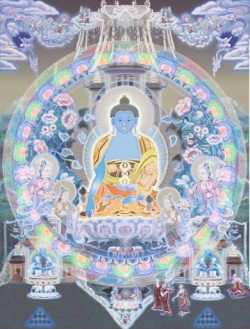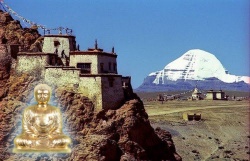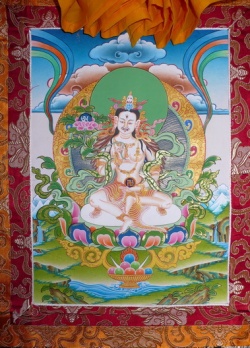Why Buddhism and the West Need Each Other
by David Loy
Zen Teacher
The mercy of the West has been social revolution. The mercy of the East has been individual insight into the basic self/void. We need both.
- Gary Snyder
Another way to put it: the highest ideal of the Western tradition has been to restructure our societies so that they are more socially just. The most important goal for Buddhism is to awaken and (to use the Zen phrase) realize one's true nature, which puts an end to dukkha "suffering" due to the delusion of a separate self. Today it has become more obvious that we need both: not just because these ideals complement each other, but because each project needs the other.
The Western conception of social justice can be traced back to the Abrahamic traditions, particularly the Hebrew prophets, who railed against oppressive rulers for afflicting the poor and powerless. Isaiah, for example, complains about those "who write oppressive laws, to turn aside the needy from justice and to rob the poor of my people of their right, that widows may be your spoil, and that you may make the orphans your prey" (Isaiah 10:2). Speaking truth to power, the prophets call for justice for the oppressed, who suffer from what might be called social dukkha.
This Abrahamic emphasis, in combination with the Greek realization that society can be restructured, eventually resulted in our modern concern to pursue social justice by reforming political and economic institutions. This includes not only democracy and labor unions but human rights movements (the abolition of slavery, the civil rights movement, feminism, LGBT liberation, etc.), none of which have been an important concern of traditional Buddhism. As valuable as these reforms have been, the limitations of such an institutional approach, by itself, are becoming evident. Even the best possible economic and political system cannot be expected to function well if the people using that system are motivated by greed, aggression, and delusion -- the "three poisons" that Buddhism identifies as unwholesome motivations, which need to be transformed into their more positive counterparts: generosity, loving-kindness, and wisdom.
Perhaps this helps us to understand why so many political revolutions have ended up replacing one gang of thugs with another gang. Beginning with the earliest Greek experience, and certainly supported by contemporary U.S. experience, there is plenty of evidence that democracy does not work very well insofar as it simply becomes another system for powerful individuals and groups to manipulate and exploit.
This unfortunate fact suggests that our modern emphasis on social transformation -- restructuring institutions to make them more just -- is necessary but not sufficient. That brings us to the Buddhist focus on personal transformation.
I'm not aware of anything in the history of Buddhism comparable to the Western concern for social justice. Although the karma teaching understands justice as an impersonal moral law built into the cosmos, historically karma has functioned differently. Combined with the doctrine of rebirth, the implication seems to be that we do not need to be concerned about promoting justice, because sooner or later everyone gets what they deserve. In practice, this has often encouraged passivity and acceptance of one's situation, rather than a commitment to promote social justice. According to the Pali Canon, the Buddha was consulted by kings and gave them advice, yet apparently he did not castigate them in the way that the Hebrew prophets did. Nor did the sangha do so after he passed away.
The Buddhist emphasis on dukkha "suffering" provides a better parallel with the Western conception of justice. Historically, Asian Buddhism has focused on individual dukkha and personal karma, a limitation that may have been necessary to survive authoritarian rulers that could and sometimes did repress Buddhist institutions. The Buddha emphasized that what he taught was dukkha and how to end it. Did he have in mind only individual dukkha -- that resulting from our own intentions and actions -- or did he possibly have a wider social vision that also encompassed structural dukkha: the suffering caused by oppressive rulers and unjust institutions? A few scholars such as Trevor Ling and Nalin Swaris have argued that the Buddha may have intended to start a movement that would transform society, rather than merely establish a monastic order with alternative values to the mainstream. Certainly his attitudes toward women and caste were extraordinarily progressive for his day.
In either case, early Buddhism as an institution soon came to an accommodation with the state, relying to some extent on the support of kings and emperors. And if you want to be supported by the powers-that-be, you'd better support the powers-that-be. Because no Asian Buddhist society was democratic, that placed limits on what types of dukkha Buddhist teachers could emphasize. The tradition as it developed did not address the exploitative policies of many rulers, which ultimately could only be resolved with some institutional transformation. On the contrary, the karma-and-rebirth teachings could easily be used, and were used, to legitimate the power of kings and princes, who must be reaping the fruits of their benevolent actions in past lifetimes, and to rationalize the disempowerment of those born poor or disabled, who must be experiencing the consequences of their unskillful actions in previous lifetimes.
The result was that Buddhism survived and thrived, spreading throughout most of Asia and developing its extraordinary collection of contemplative practices that can help us transform ourselves. The emphasis, obviously, has been on the spiritual development of the individual. Whether or not that was completely faithful to the ideals of its founder, today globalizing Buddhism finds itself in a new situation, in most locales no longer subject to oppressive governments, and we also have a much better understanding of the structural causes of dukkha. The globalization of democracy, human rights, and freedom of speech opens the door to new ways of responding to social and institutional dukkha.
Admittedly, some of the implications of such a broader understanding of dukkha, and of a broader responsibility for addressing structural dukkha, are quite radical. They require re-thinking some cherished Buddhist teachings, beginning with karma itself. The conventional Buddhist view of one's own karmic stream as individual and discrete is normally understood to mean that I myself am ultimately responsible for what happens to me: it is the result of my previous (skillful and unskillful) actions. "What terrible personal karma each of those European Jews must have had, to have been born into Nazi Germany! And the dalit untouchables who are still oppressed in India today." But does this amount to blaming the victim? Today we are more aware of the suffering created by political, economic, and military institutions, and the importance of finding ways to address such structural causes of dukkha brings us very close to the Abrahamic concern for social justice.
Another way to express the interrelationship between the Western ideal of social transformation (to address social dukkha) and the Buddhist goal of personal transformation (to address individual dukkha) is in terms of different types of freedom. The emphasis of the modern West has been on individual freedom from oppressive institutions, a prime example being the Bill of Rights appended to the U.S. Constitution. The emphasis of Buddhism (and some other Indian traditions) has been on what might be called psycho-spiritual freedom. Freedom for the self, or freedom from the (ego)self? Today we can see more clearly the limitations of each freedom by itself. What have I gained if I am free from external control but still at the mercy of my own greed, aggression, and delusions? And awakening from the delusion of a separate self will not by itself free me, or all those with whom I remain interdependent, from the dukkha perpetuated by an exploitative economic system and an oppressive government. We need to actualize both ideals to be truly free.
David Loy is part of the Ecobuddhism project.



